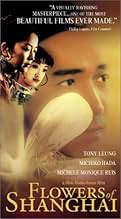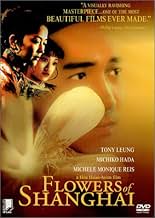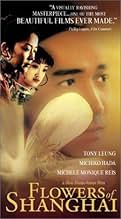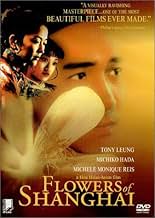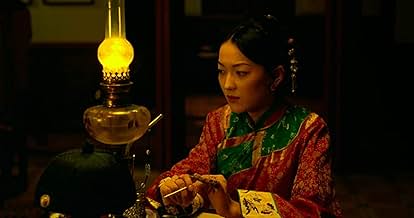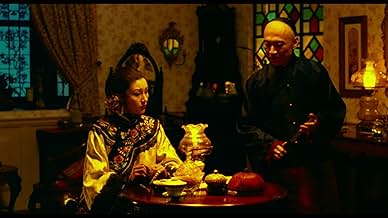IMDb RATING
7.3/10
4.4K
YOUR RATING
In the "flower houses" (upscale brothels) of Shanghai, various interweaving stories of love, loyalty, and deceit play out subtly.In the "flower houses" (upscale brothels) of Shanghai, various interweaving stories of love, loyalty, and deceit play out subtly.In the "flower houses" (upscale brothels) of Shanghai, various interweaving stories of love, loyalty, and deceit play out subtly.
- Director
- Writers
- Stars
- Awards
- 6 wins & 6 nominations total
Tony Leung Chiu-wai
- Wang Lingsheng
- (as Tony Chiu Wai Leung)
Michelle Reis
- Emerald
- (as Michelle Monique Reis)
Carina Lau
- Pearl
- (as Carina Lau Ka-ling)
Rebecca Pan
- Huang
- (as Rebecca Pan Wan-ching)
Tony Chang
- Peking Opera Actor
- (as Tony Chang Ruei-che)
Yiu-Ming Lee
- Azhu
- (as Yu-ming Lee)
- Director
- Writers
- All cast & crew
- Production, box office & more at IMDbPro
Featured reviews
The Taiwanese writer-director Hou Hsiao-hsien is regarded by many as the greatest living filmmaker, and FLOWERS OF SHANGHAI is widely considered one of the strongest contemporary movies. Hou's approach is both anthropological and highly formalized: this examination of the economics and Machiavellian power politics of a Shanghai brothel in the mid-1800's stays remote. The feeling is sometimes that of a news crew eager not to intrude, but the mise-en-scene evokes the mastery of space-carving in Kurosawa's HIGH AND LOW or Bresson's UNE FEMME DOUCE. Shot in wide, mobile masters that go on for four or five minutes at a stretch, FLOWERS is theatrical in the extreme, and, as in a Yuan drama or a Kun opera, Hou stays at a more than respectful reserve from his characters. For some, this spells high-art elegance; others may feel starved for vividness and human immediacy, and wish the film to end far sooner than it does.
This movie was absolutely brilliant.
It was filmed in a manner that makes it seem more realistic than most movies. Each frame is beautiful.
A note on dialect - This movie (with the exception of Leung to his mistress) is in Wu Chinese. Wu is hardly a minor language, spoken by well over 70 million people worldwide. It is spoken not only in Shanghai (the largest city in China) but the surrounding provinces, including such large cities as Suzhou and Wenzhou. It is actually more widely spoken than Cantonese and Taiwanese combined, making it the second-most-spoken variety of Chinese, dwarfed only by Mandarin. (70 million speakers is a lot of people; many national languages in Europe have fewer speakers) However, Wu is not spoken by as many overseas Chinese as are Cantonese, Mandarin, and Hokkien (aka Taiwanese, Minnan, etc), and for that reason less Westerners speak it. (in addition, Cantonese, Hokkien, and Mandarin are all the primary languages of at least one self-ruling political unit, even though the former two have less speakers than Wu)
This is the only well-known movie with dialogue primarily in Wu, and it is based on the 19th century Wu novel by the same name (except read as Wu).
It was filmed in a manner that makes it seem more realistic than most movies. Each frame is beautiful.
A note on dialect - This movie (with the exception of Leung to his mistress) is in Wu Chinese. Wu is hardly a minor language, spoken by well over 70 million people worldwide. It is spoken not only in Shanghai (the largest city in China) but the surrounding provinces, including such large cities as Suzhou and Wenzhou. It is actually more widely spoken than Cantonese and Taiwanese combined, making it the second-most-spoken variety of Chinese, dwarfed only by Mandarin. (70 million speakers is a lot of people; many national languages in Europe have fewer speakers) However, Wu is not spoken by as many overseas Chinese as are Cantonese, Mandarin, and Hokkien (aka Taiwanese, Minnan, etc), and for that reason less Westerners speak it. (in addition, Cantonese, Hokkien, and Mandarin are all the primary languages of at least one self-ruling political unit, even though the former two have less speakers than Wu)
This is the only well-known movie with dialogue primarily in Wu, and it is based on the 19th century Wu novel by the same name (except read as Wu).
10pcg
This hypnotically beautiful film may recall a dream, but the material world of money and power, indentured servitude and beatings everywhere intrudes on it. We discover in the contrasting stories of Emerald, Pearl, Crimson, Jade, and Crystal, how some survive as "flower girls" and others are crushed. Far from being boring or cold, the film is compelling dramatically and emotionally. "Flowers of Shanghai" seems to contain boundless reserves of sadness and rage -- it is as if the sex and violence are not on screen because Hou cannot bear to show them. If "Flowers of Shanghai" is an opium dream, as many have said, the opium is both bringing pleasure and suppressing pain.
"Flowers of Shanghai" shows compassion for its characters, both the innocents and those who survive through cynical manipulation. The scene-length takes in medium shots work to establish respect for each person within the film, while at the same time bringing about a kind of "rectification of names," systematically exposing the hypocrisy of the brothels. It's appropriate that one of the few moments of violent action in the film occurs when Master Wang smashes the exquisite interior decoration in a room: "Flowers of Shanghai" shows the seductive beauty of the brothel then reveals it to be a cage. Everyone in the film is on multiple levels unfree: the women are financially bound to the brothels and dependent on the whims of their clients, and almost everyone is addicted to opium.
The film never leaves the brothels. This expresses how the brothels in fact own the women. However, as Stephen Teo noted in CinemaScope, there's another detail that's easy to overlook: the women's bound feet prevent them from easily walking more than a few feet.
"Flowers of Shanghai" shows compassion for its characters, both the innocents and those who survive through cynical manipulation. The scene-length takes in medium shots work to establish respect for each person within the film, while at the same time bringing about a kind of "rectification of names," systematically exposing the hypocrisy of the brothels. It's appropriate that one of the few moments of violent action in the film occurs when Master Wang smashes the exquisite interior decoration in a room: "Flowers of Shanghai" shows the seductive beauty of the brothel then reveals it to be a cage. Everyone in the film is on multiple levels unfree: the women are financially bound to the brothels and dependent on the whims of their clients, and almost everyone is addicted to opium.
The film never leaves the brothels. This expresses how the brothels in fact own the women. However, as Stephen Teo noted in CinemaScope, there's another detail that's easy to overlook: the women's bound feet prevent them from easily walking more than a few feet.
First, a disclaimer: I love so-called "art films", from Cocteau and Eisenstein to David Lynch and Krystof Kieslowski. I have a long attention span and am willing to extend considerable effort towards appreciating any work of art.
Having said that, The Flowers of Shanghai was largely a disappointment. Yes, the sets and costuming are sumptuous. True, the mood evoked by the film is seductive. And the subject matter--the relationships between courtesans and their clients--is at least provocative. But for a number of reasons, Hou fails to deliver a film that rises above those elements.
The reasons are many. First, the plot is minimal--hardly compelling--mostly relying upon the petty machinations between the courtesans and the clients who try not to become too involved with them. But such a minimal plot can only engage if we become involved in the characters, and this is very difficult to do.
That's problem number two: the characters simply aren't compelling. The men tend to be equivocal and emotionally distant. The women tend to be shallow and manipulative. Since there are essentially no close-up shots, and the physical expressions are very restrained, we have no sense of people's emotional states. There is not one character that we can really care about.
Third: the editing is leisurely. Really leisurely. Glacial. Very few directors can pull off a five minute interior shot with almost no dialogue or action; Ozu was one. But Hou--although better than many contemporary directors--isn't up to Ozu's level by a long shot. Hou's scenes, unlike Ozu's, don't so much engender our contemplation as they engender tedium. A director has to be able to recognize when a scene has come to the end of its life; this he doesn't seem to be able to do.
A note to the curious: every shot in this film is an interior shot; you never see the outdoors--not even the sky through the windows. And despite the subject matter and the warnings of adult content on the box, there are no sex scenes; there is no nudity. Structure-wise, the film depicts three activities: men playing "rock, paper, scissors" around a table, people having their little dramas in private, and people brooding.
That's basically it.
I would like to be able to say that The Flowers of Shanghai was more than just a 2-hours-plus visual curiosity, but it simply isn't. And more the shame because of its wasted potential.
Having said that, The Flowers of Shanghai was largely a disappointment. Yes, the sets and costuming are sumptuous. True, the mood evoked by the film is seductive. And the subject matter--the relationships between courtesans and their clients--is at least provocative. But for a number of reasons, Hou fails to deliver a film that rises above those elements.
The reasons are many. First, the plot is minimal--hardly compelling--mostly relying upon the petty machinations between the courtesans and the clients who try not to become too involved with them. But such a minimal plot can only engage if we become involved in the characters, and this is very difficult to do.
That's problem number two: the characters simply aren't compelling. The men tend to be equivocal and emotionally distant. The women tend to be shallow and manipulative. Since there are essentially no close-up shots, and the physical expressions are very restrained, we have no sense of people's emotional states. There is not one character that we can really care about.
Third: the editing is leisurely. Really leisurely. Glacial. Very few directors can pull off a five minute interior shot with almost no dialogue or action; Ozu was one. But Hou--although better than many contemporary directors--isn't up to Ozu's level by a long shot. Hou's scenes, unlike Ozu's, don't so much engender our contemplation as they engender tedium. A director has to be able to recognize when a scene has come to the end of its life; this he doesn't seem to be able to do.
A note to the curious: every shot in this film is an interior shot; you never see the outdoors--not even the sky through the windows. And despite the subject matter and the warnings of adult content on the box, there are no sex scenes; there is no nudity. Structure-wise, the film depicts three activities: men playing "rock, paper, scissors" around a table, people having their little dramas in private, and people brooding.
That's basically it.
I would like to be able to say that The Flowers of Shanghai was more than just a 2-hours-plus visual curiosity, but it simply isn't. And more the shame because of its wasted potential.
I saw this film at Cannes where delegates, including would-be intelligent critics emerged from the film scratching their heads and mumbling 'interesting' - a sure sign that they couldn't understand a word of it. For me it had been an epiphanous experience.
Six months later Cahiers du Cinema voted it the best film of its year...
I am sure there is a word to describe the effect of the film, but I can't lay my hand on it, so I will say 'emotionally disjoint'. As the men sit around playing Mah Jong talking, generally of trivia, huge emotional dramas are going on, but obliquely, in relation to the girls in the brothel. The effect is crushing.
I thought, while watching, mainly of Jean-Marie Straub as it has a minimalist side, but with such greater emotional power and resonance. It is so tragic that this magnificent film has had such a poor release in the west - no theatrical distribution at all in the UK...
Six months later Cahiers du Cinema voted it the best film of its year...
I am sure there is a word to describe the effect of the film, but I can't lay my hand on it, so I will say 'emotionally disjoint'. As the men sit around playing Mah Jong talking, generally of trivia, huge emotional dramas are going on, but obliquely, in relation to the girls in the brothel. The effect is crushing.
I thought, while watching, mainly of Jean-Marie Straub as it has a minimalist side, but with such greater emotional power and resonance. It is so tragic that this magnificent film has had such a poor release in the west - no theatrical distribution at all in the UK...
Did you know
- TriviaThe film consists of 38 long shots.
- ConnectionsFeatured in I Wish I Knew: Histoires de Shanghai (2010)
- How long is Flowers of Shanghai?Powered by Alexa
Details
- Release date
- Countries of origin
- Languages
- Also known as
- Flowers of Shanghai
- Production companies
- See more company credits at IMDbPro
Contribute to this page
Suggest an edit or add missing content

Top Gap
By what name was Les fleurs de Shanghai (1998) officially released in India in English?
Answer

